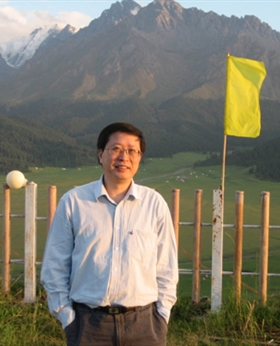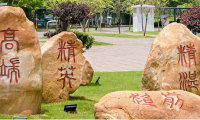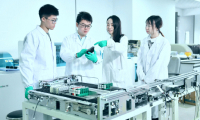Supervisors

Zhu, Wei-Guo (Distinguished Professor)
School of Medical Sciences
Distinguished Professor
Department of Biochemistry and Molecular Biology
BIOGRAPHICAL SKETCH
?
| ? | |
| ? | ? |
NAME: Zhu, Wei-Guo
POSITION TITLE: Distinguished Professor, Director of Shenzhen University Health Science Center; Dean of School of Medicine, Shenzhen University; Director of Guangdong Key Laboratory for “Genome Instability and Human Diseases”; Director of Beijing Key Laboratory for “Post-translational Modifications and Cellular Function”
?
| ? | |
| ? | ? |
EDUCATION/TRAINING
?
|
INSTITUTION AND LOCATION |
DEGREE |
COMLETION DATE |
FIELD OF STUDY |
|
Wannan Medical College, China |
B. Med |
07/1984 |
Clinic Medicine |
|
Jiangxi Medical College, China |
M.Sc. |
07/1988 |
Pharmacology |
|
Kyushu University, Fukuoka, Japan |
Ph.D. |
03/1997 |
Cancer Biology |
|
Indiana University School of Medicine, Indiana, USA |
Postdoctoral |
12/1999 |
Cancer Biology |
|
Ohio State University CCC, Ohio, USA |
Postdoctoral |
04/2003 |
Cancer Epigenetics |
A. Personal statement
My lab mainly focuses on the molecular mechanisms of epigenetic regulation in cancer development and therapy. Over the past decade, I have been trying to understand the roles of epigenetic regulators in the DNA damage response and repair, genome instability and autophagy and other cancer-related cellular processes. Together with my colleagues and students, we have managed to accomplish some original findings and published >100 articles and reviews in high-profile journals such as Nature, Nat Cell Biol, Mol Cell, J Natl Cancer Inst, Proc Natl Acad Sci U S A, EMBO J, Cell Reaseearch, Mol Cell Biol, EMBO Rep, J Biol Chem, Cancer Res, and Oncogene, which have been cited >5000 times (H-index = 38). I am currently an academic editor for PLoS One, the World Journal of Biological Chemistry, Science China Life Science, ABBS, Signal Transduction and Targeted Therapy and many other journals. My research has been continuously funded by the National Natural Science Foundation of China (NSFC), Ministry of Education, Ministry of Science and Technology and the local government. I have also been funded by the National Outstanding Youth Fund project and I am now the Chief Scientist of the Innovative Team of the NSFC. I also serve as the Director of the Beijing Key Laboratory for “Post-translational modifications and Cellular Function” and the Guangdong Key Laboratory for "Genome Instability and Human Disease Prevention". I have held several concurrent positions, including the Vice President of the Chinese Cancer Society, Division of Basic Research, the Vice President of the Chinese Society for Medical Biochemistry and the Vice President of the Chinese Society for Biochemistry, Division of Gene Expression, and am a member of the standing committee of the Chinese Society for Biochemistry.
?
B. Positions and honors
Positions
1988-1992 Lecturer, Jiangxi Medical College, China
2003-2015 Professor, Peking University Health Sciences Center, Beijing, China
2011-2015 Principal Investigator, Peking University-Tsinghua University Center for life Sci, Beijing, China
2015-present Distinguished Professor, Shenzhen University School of Medicine, Shenzhen, Guangdong, China
?
Honors
2016 Award for Science and Technology, Beijing, 2nd position
2011 Award for Chinese Medical Sciences, 2nd Position
2011 Award for WuXi AppTec “Life Chemistry”, 2nd position
2009 Award for Natural Sciences, Minister of Education of China, 1st Position
?
C. Representative publications (selected publications in recent ten years)
1.????? Yang Q, Zhu Q, Lu X, Du Y, Cao L, Shen C, Hou T, Li M, Li Z, Liu C, Wu D, Xu X, Wang L, Wang H, Zhao Y, Yang Y, Zhu WG*. (2017) G9a coordinates with the RPA complex to promote DNA damage repair and cell survival. Proc Natl Acad Sci U S A. 2017 Jul 25;114(30):E6054-E6063.
2.????? Tang M, Lu X, Zhang C, Du C, Cao L, Hou T, Li Z, Tu B, Cao Z, Li Y, Chen Y, Jiang L, Wang H, Wang L, Liu B, Xu X, Luo J, Wang J, Gu J, Wang H*, Zhu WG*. (2017) Downregulation of SIRT7 by 5-fluorouracil induces radiosensitivity in human colorectal cancer. Theranostics. 2017 Mar 22;7(5):1346-1359.
3.????? Ma K, Fu W, Tang M, Zhang C, Hou T, Li R, Lu X, Wang Y, Zhou J, Li X, Zhang L, Wang L, Zhao Y*, Zhu WG*. (2017) PTK2-mediated degradation of ATG3 impedes cancer cells susceptible to DNA damage treatment. Autophagy. 2017 Mar 4;13(3):579-591.
4.????? Wang D, Kon N, Lasso G, Jiang L, Leng W, Zhu WG, Qin J, Honig B, Gu W*. (2016) Acetylation-regulated interaction between p53 and SET reveals a widespread regulatory mode. Nature. 2016 Sep 14;538(7623):118-122.
5.????? Wang Y, Zhang N, Zhang L, Li R, Fu W, Ma K, Li X, Wang L, Wang J, Zhang H, Gu W, Zhu WG*, Zhao Y*. (2016) Autophagy Regulates Chromatin Ubiquitination in DNA Damage Response through Elimination of SQSTM1/p62. Mol Cell. 2016 Jul 7;63(1):34-48.
6.????? Cao, L-L., Wei, F., Du, Y., Song, B., Wang, D., Shen C, Lu X, Cao Z, Yang Q, Gao Y, Wang L, Zhao Y, Wang H, Yang Y, Zhu WG*. (2015). ATM-mediated KDM2A phosphorylation is required for the DNA damage response. Oncogene. 2015 Mar 30.
7.????? Shen C, Wang D, Liu X, Gu B, Du Y, Wei FZ, Cao LL, Song B, Lu X, Yang Q, Zhu Q, Hou T, Li M, Wang L, Wang H, Zhao Y, Yang Y, Zhu WG*. (2015). SET7/9 regulates cancer cell proliferation by influencing β-catenin stability. FASEB J. Jun 26. pii: fj.15-273540.
8.????? Wei F, Cao Z, Wang X, Wang H, Cai MY, Li T, Hattori N, Wang D, Du Y, Song B, Cao LL, Shen C, Wang L, Wang H, Yang Y, Xie D, Wang F, Ushijima T, Zhao,Y*, Zhu WG*. (2015). Epigenetic regulation of autophagy by the methyltransferase EZH2 through an MTOR-dependent pathway. Autophagy. 2015;11(12):2309-22.
9.????? Zhang P, Tu B, Wang H, Cao Z, Tang M, Zhang C, Gu B, Li Z, Wang L, Yang Y, Zhao Y, Wang H, Luo J, Deng CX, Gao B, Roeder RG*, Zhu WG*. (2014) Tumor suppressor p53 cooperates with SIRT6 to regulate gluconeogenesis by promoting FoxO1 nuclear exclusion. Proc Natl Acad Sci USA. 111(29): 10684-9.
10.?? Wang D, Zhou J, Liu X, Lu D, Shen C, Du Y, Wei FZ, Song B, Lu X, Yu Y, Wang L, Zhao Y, Wang H, Yang Y, Akiyama Y, Zhang H, Zhu WG*. (2013). Methylation of SUV39H1 by SET7/9 results in heterochromatin relaxation and genome instability. Proc Natl Acad Sci USA. 110(14): 5516-21.
11.?? Zhao Y, Li X, Cai MY, Ma K, Yang J, Zhou J, Fu W, Wei FZ, Wang L, Xie D, Zhu WG*. (2013). XBP-1u suppresses autophagy by promoting the degradation of FoxO1 in cancer cells. Cell Res. 23(4): 491-507.
12.?? Zheng Z, Li L, Liu X, Wang D, Tu B, Wang L, Wang H, Zhu WG*. (2012) 5-Aza-2'-deoxycytidine reactivates gene expression via degradation of pRb pocket proteins. FASEB J. 26(1):449-459.
13.?? Wang H, Zhou W, Zheng Z, Zhang P, Tu B, He Q, Zhu WG*. (2012) The HDAC inhibitor depsipeptide transactivates the p53/p21 pathway by inducing DNA damage. DNA Repair (Amst). 11(2):146-156.
14.?? Zhou J, Liao W, Yang J, Ma K, Li X, Wang Y, Wang D, Wang L, Zhang Y, Yin Y, Zhao Y, Zhu WG*. (2012) FOXO3 induces FOXO1-dependent autophagy by activating the AKT1 signaling pathway. Autophagy. 8(12): 1712-23.
15.?? Liu X, Wang D, Zhao Y, Tu B, Zheng Z, Wang L, Wang H, Gu W, Roeder RG*, Zhu WG*. (2011) Methyltransferase Set7/9 regulates p53 activity by interacting with Sirtuin 1 (SIRT1).Proc Natl Acad Sci USA. 108(5):1925-1930.
16.?? Yang J, Zhao Y, Ma K, Jiang FJ, Liao W, Zhang P, Zhou J, Tu B, Wang L, Kampinga HH, Xie Z, Zhu WG*. (2011). Deficiency of hepatocystin induces autophagy through an mTOR-dependent pathway. Autophagy. 7(7):748-59.
17.?? Zhao Y, Yang J, Liao W, Liu X, Zhang H, Wang S, Wang D, Feng J, Yu L, Zhu WG*. (2010) Cytosolic FoxO1 is essential for the induction of autophagy and tumour suppressor activity. Nat Cell Biol. 2010 Jul;12(7):665-75.
18.?? Chen D, Shan J, Zhu WG, Qin J, Gu W*. (2010) Transcription-independent ARF regulation in oncogenic stress-mediated p53 responses. Nature. 2010 Mar 25;464(7288):624-7.
19.?? Yu Y, Cai JP, Tu B, Wu L, Zhao Y, Liu X, Li L, McNutt MA, Feng J, He Q, Yang Y, Wang H, Sekiguchi M, Zhu WG*. (2009) Proliferating cell nuclear antigen is protected from degradation by forming a complex with MutT Homolog2. J Biol Chem. 2009 Jul 17;284(29):19310-20.
20.?? Wu LP, Wang X, Li L, Zhao Y, Lu S, Yu Y, Zhou W, Liu X, Yang J, Zheng Z, Zhang H, Feng J, Yang Y, Wang H, Zhu WG*. (2008) Histone deacetylase inhibitor depsipeptide activates silenced genes through decreasing both CpG and H3K9 methylation on the promoter. Mol Cell Biol. 2008 May;28(10):3219-35.
?
D. Research support
Ongoing projects (RMB)
National Key R&D Program of China (2017YFA0503900)?? ????????????01/01/2018 to 12/31/2022
Wei-Guo Zhu, PI????????????????????????????? ???????????????????????????¥28,790,000
Molecular mechanism of novel DNA damage responding protein machineries in regulating genome stability
?
NSFC (China) interactional collaboration project (81720108027)???????? 01/01/2018 to 12/31/2022
Wei-Guo Zhu, PI?? ??????????????????????????????????????????????????????¥2,300,000
Mechanistic study and molecular network of the reciprocal regulation between histone deacetylase Sirtuin and p53
?
NSFC (China) innovative research team (81621063)?????? ????????????01/01/2017 to 12/31/2019
Wei-Guo Zhu, PI?????????????????????????????????????????? ??????????????¥5,200,000
Molecular mechanism of protein post-translational modifications in cancer development and metastasis
?
NSFC (China) key project (81530074)?????????????????? ?????????????01/01/2016 to 12/31/2020
Wei-Guo Zhu, PI????????????????????????????????????????? ???????????????¥2,730,000
Molecular mechanism of histone methyltransferase G9a in tumor cell lipid metabolism
?
NSFC (China) general project (31570812)???????????? ???????????????01/01/2016 to 12/31/2019
Wei-Guo Zhu, PI?????????????????????????????????????????? ???????????????¥660,000
The study of histone acetyltransferase Tip60 participating in regulating genome stability through SUV39H1
?
Shenzhen Basic Research Project (JCYJ20160427104855100) ????????06/22/2016 to 06/22/2019
Wei-Guo Zhu, PI????????????????????????????????????????? ???????????????¥3,000,000
Mechanistic study of the synergistic anti-tumor effects of histone deacetylase inhibitors and nucleotide analogues
Contact
?Email: zhuweiguo@szu.edu.cn
?Office Tel:?0755-86930347








用户登录
还没有账号?
立即注册